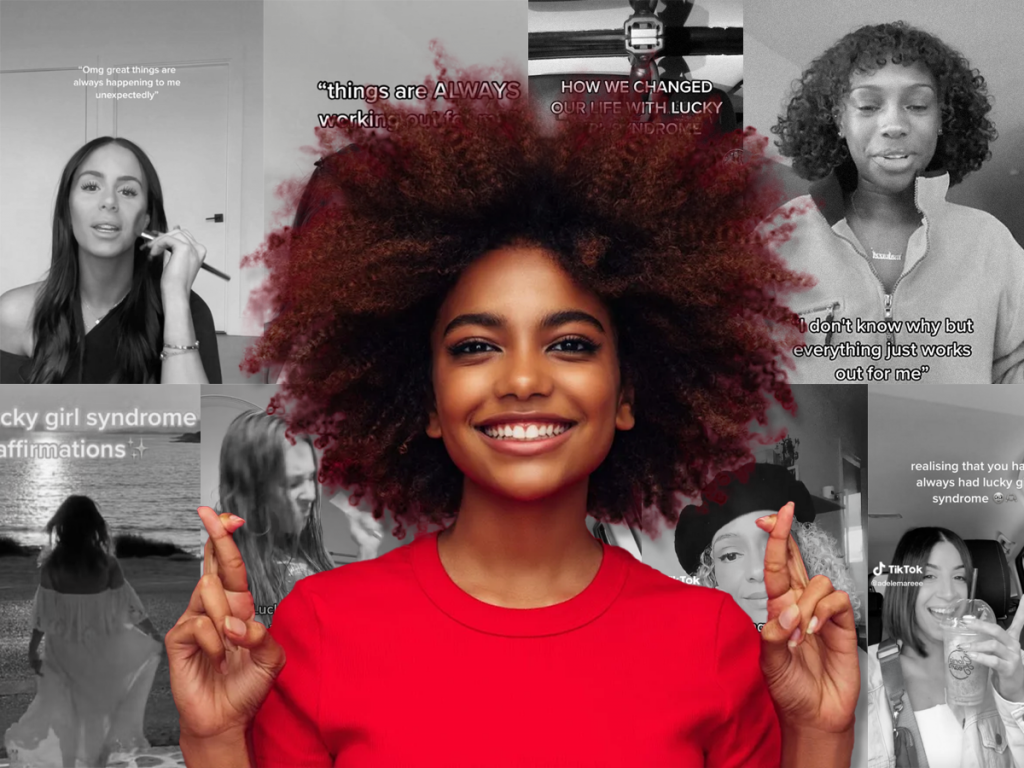‘Lucky Girl Syndrome’ has quickly spiralled on TikTok as the latest internet trend. Rebecca Pearson explores whether luck has anything to do with it and what it reveals about positive thinking mindsets.
You’ve probably stumbled upon the videos of young women asserting how lucky they are – how everything goes their way. ‘Lucky Girl Syndrome’ is the latest internet trend, the idea that if you repeat to the universe that good fortune is innately yours, anything you want will come true.
As a trend, it was Laura Galebe who first set the idea running on TikTok in December. Amidst her many wellness videos and mindset thought-pieces, she proclaimed that manifesting, repeating I am so lucky and everything goes my way, was the answer to having all of your dreams come true. Her testimony quickly garnered interest, as well as other young women who – in their amused surprise – found that the trend had magically benefitted them too. All of a sudden what felt like half of TikTok were floating the phrases of luck and deservedness.
So, is it true?
Despite its name, Lucky Girl Syndrome is a reconfiguration of the law of assumption – that anything you want can come true by assuming that it’s already yours. If we also look at other mindset belief systems, ideas like confirmation bias follow a similar suit. Psychologically, if we are already looking for certain outcomes based on our existing beliefs, we are more likely to find them. If everything is going well today, you’re probably more likely to find other things that have suddenly gone well for you too, but knock over your glass of morning coffee, stub your toe on the kitchen door and wake up to find that your phone never charged, and you’ll probably find that the rest of your day is edged with annoyance and dismay.
With a trend name that limits itself to girls, it certainly makes a fresh change from so many societal clamps that put girls on the back foot and instil in them mindsets that limit their ability to grow and change. Positive thinking, similarly underlying psychological processes like Cognitive Behavioural Therapy, can certainly make a headway into altering personal belief systems in life-changing ways. However, this doesn’t mean to say that Lucky Girl Syndrome and simplified modes of positive thinking aren’t without their faults.
As with so many trends online, and especially TikTok trends, Lucky Girl Syndrome has often been promoted by stereotypically pretty young white women. Between race, skin colour, income, class and “pretty privilege”, there are so many other factors that can swing into someone’s life successes. Lucky Girl Syndrome starts to sound a lot like Molly-Mae’s infamous claim that “everyone has the same twenty-four hours in a day”. Add in the potential dangers of disillusionment, false belief systems and a lack of self-awareness, and Lucky Girl System becomes turbulent. Yes, the trend helps ease positive thinking into a daily mindset, but it also disregards many factors that are beyond a lucky girl’s control.
Lucky and successful or not, it’s still a trend that’s steeped in privilege. It teeters between positive change wrought from positive mindset shifts and affirmations, to blatant toxic positivity.
Edited by – Rebecca Pearson (Deputy Editor)
Header designed by – Sarim Mangi (Head of Design)


